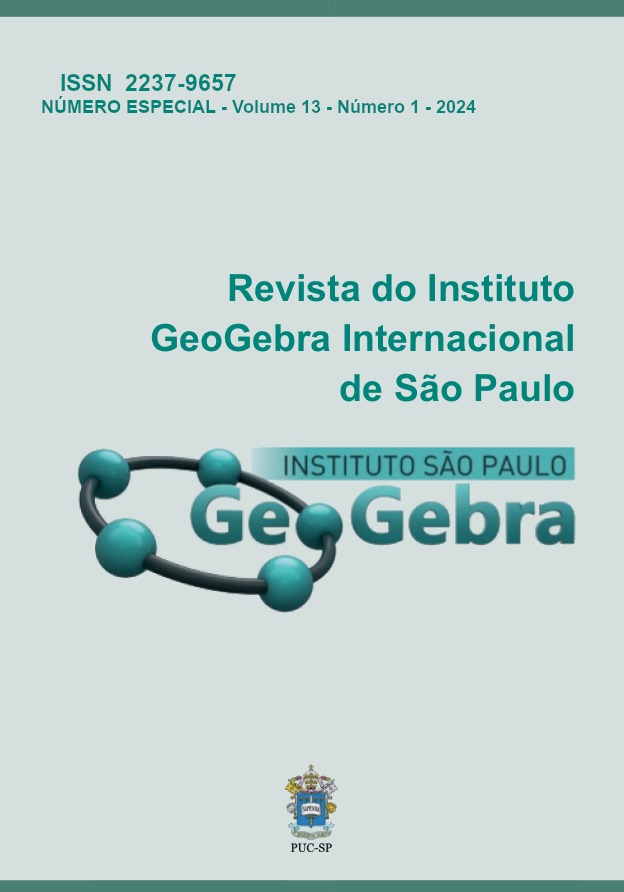GeoGebra as a support tool for meaningful learning of linear translation of trigonometric functions.
DOI:
https://doi.org/10.23925/2237-9657.2024.v13i1p034-054Keywords:
Meaningful learning, trigonometric translation, GeoGebra and STEAM EducationAbstract
In the current context, with technological advances, it is fundamental that the teacher is not limited to a mere structuring of contents, following the logical sequence of the teaching programs recommended for each class. This research, part of the project “GeoGebra & STEAM: implications for improving Mathematics Education in Portuguese Speaking Countries”, is of a qualitative nature and falls within the scope of a classroom experience whose general objective is to help students to understand the conceptual structuring of translations of trigonometric functions applied in everyday life and their unique behaviors. By bringing a technological approach such as the use of the GeoGebra Software for teaching Trigonometric Functions, in particular, linear translations, it was possible to perceive that the proposal was of great importance, since it awakened in the students possibilities of studies that facilitated the teaching and learning process. Through the observation of emotions, everyone was very interested and participatory, always dialoguing and discussing among themselves all the requested activities, showing curiosity and enthusiasm.
References
ANTONIASSI, Kleber Rodrigo. Ensino através de situações-problema. São Carlos, 2013.
CANAVARRO, A. P. Ensino exploratório da Matemática: Práticas e desafios. Em Educação e Matemática,. Associação de Professores de Matemática, 2021.
COVEY, Stephen. “Os 7 Hábitos das Pessoas Altamente Eficazes: Put First Things First .” (1989).
D’AMBROSIO, U. Matemática e sociedade ou sociedade e matemática? A difícil questão da primazia. Conferência de Abertura. Recife: SBEM: Anais do VII ENEM, 2004.
FONSECA, BRUNHEIRA, PONTE, As actividades de Investigação, o professor e a aula de Matemática. Ed. 91-101. APM: Actas do ProfMat 99, 1999.
MARCONI, Marina de Andrade e EVA Maria Lakatos. Técnicas de Pesquisa. Vol. 5. São Paulo: Atlas, 2002.
NCTM. National Council Teachers of Mathematics. 2008. <https://www.nctm.org>.
OLDKNOW, ADRIAN e CAROL KNIGHTS. Mathematics Education with Digital Technology (Education and Digital Technology. Bloomsbury Academic: Edição Reprint, 2011.
PAULOS, J. A. Mas aliá de los números: meditaciones de un matemático. 1993.
Fernandes Pereira, Ângela E., & Correia Vaz, H. V., O GeoGebra no Estudo de Funções Trigonométricas a partir da Análise Gráfica. Revista do Instituto de Geogebra Internacional De São Paulo, 2022, 11(2), 119-137. https://doi.org/10.23925/2237-9657.2022.v11i2p119-137
PÓLYA, George. Como resolver problemas: Um aspecto novo do método matemático. Lisboa: Gradiva (publicado originalmente em inglês em 1945). 2003.
PONTE, J. P. Investigar a nossa própria prática. Reflectir e investigar sobre a prática profissional. APM., 2002.
PONTE, J. P., et al. Didáctica da Matemática. Lisboa: DES do ME, 1997.
ROSÁRIO, P. e Almeida, L. “As estratégias de aprendizagem nas diferentes abordagens ao estudo: uma investigação com alunos do Ensino Secundário.” Portuguesa de Psicoloxia e Educación, 1999: 273-280.
ROSÁRIO, P. Estudar o estudar – (Des)venturas do Testas. Porto: Porto Editora, 2004.
ROSÁRIO, P. Variáveis Cognitivo-motivacionais na Aprendizagem: As “Abordagens ao Estudo “em alunos do Ensino Secundário” (Tese de Doutoramento não publicada). Braga: Instituto de Educação e Psicologia da Universidade do Minho, 1999a.
SANTOS, J. S. e A. I. R. Homa. Tecnologia Digital para o Ensino da Trigonometria: Uma Proposta Desenvolvida como Oficinas para professores licenciados em matemática. ISSN 2316-7785, 2018.
Downloads
Published
How to Cite
Issue
Section
License
Copyright (c) 2024 Revista do Instituto GeoGebra Internacional de São Paulo

This work is licensed under a Creative Commons Attribution 4.0 International License.
Submission, processing, and publication of articles sent to the journal and registration of the DOI at Crossref is free of charge.
Authors retain their copyright and grant the journal the right of first publication of their article, which is simultaneously licensed under a Creative Commons - Attribution 4.0 International license CC BY that allows others to share the article by acknowledging its authorship and initial publication by the journal.
The GeoGebra journal encourages its authors to register their work with information and communication management systems aimed at researchers, such as Academia.edu, Mendeley, ResearchGate, etc.


 10.23925
10.23925
